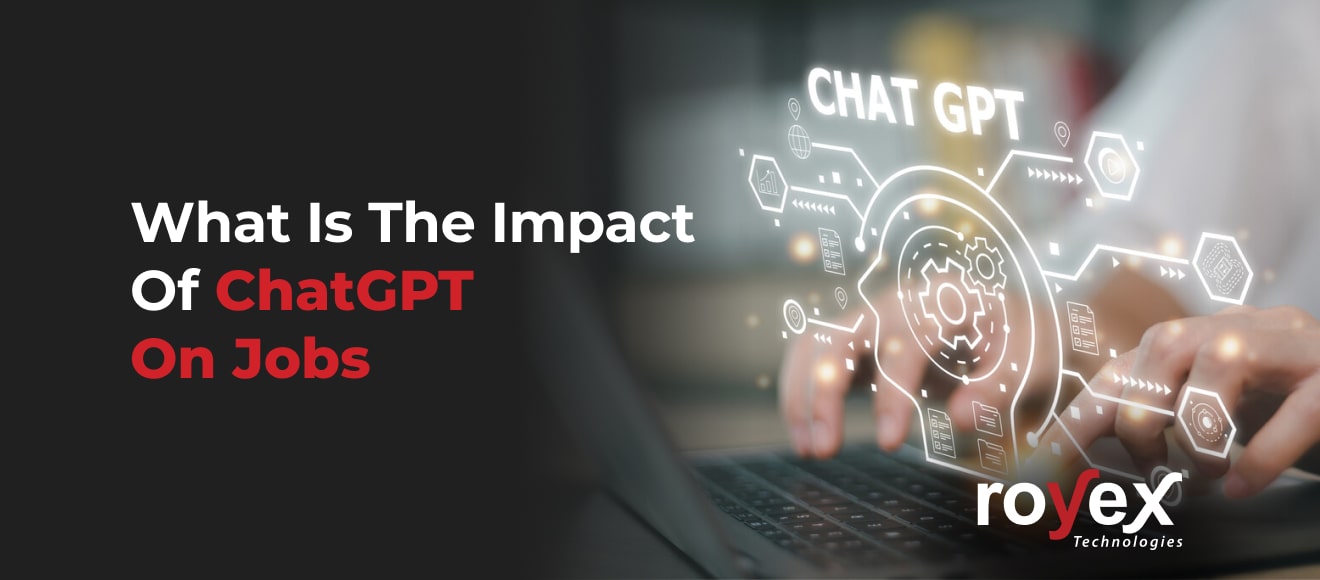
What Is the Impact of ChatGPT on Jobs
In November 2022, OpenAI, an artificial intelligence (AI) research laboratory released a very advanced AI program named ChatGPT. But OpenAI didn't stop there – they've been constantly updating and improving ChatGPT over and over again. r. The newest version, ChatGPT 4.0, is their biggest upgrade so far and is so capable that it could significantly impact teaching jobs. Since its launch, ChatGPT and its impacts on jobs have been the center of heated debate. As this powerful chatbot continues to evolve, it is influencing many industries, like content creation and education, changing how we work and raising important questions about the future of employment. While some celebrate the efficiency and innovation ChatGPT brings, others worry it could cost people their jobs and drastically change professional roles. This article looks at the many ways ChatGPT impacts jobs, discussing both the opportunities and challenges it creates in today's workforce.
The Launch of GPT-4o: A Game-Changer
The latest iteration of OpenAI's language model, ChatGPT-4.0, represents a significant leap in artificial intelligence technology. With each new update, OpenAI is intentionally pushing the boundaries of what AI can achieve, providing ever more powerful tools for businesses, educators, and individuals. GPT4o represents a major breakthrough in AI. It gives users an unmatched level of intelligence, speed, and flexibility. Unlike previous models, this one can process and interact with different types of data such as text, images, and speech in real time with no perceptible delay. This sets a new bar for AI interaction by permitting the users to converse more freely with ChatGPT.
During a live stream event, OpenAI showcased the remarkable capabilities of GPT-4o, leaving audiences in awe. The model effortlessly solved complex mathematical equations by analyzing images captured through a smartphone camera, read aloud text with natural inflections, and even adapted its speech style in response to verbal prompts. Additionally, GPT-4o demonstrated its prowess in holding engaging conversations, offering insightful advice and evaluating breathing patterns to suggest stress-reduction techniques.
Revolutionizing Content Writing
AI is completely changing how content gets written. The new ChatGPT-4.0 AI is incredibly good at understanding and writing like humans. It can create high-quality articles, marketing materials, social media posts and more in just minutes, way faster than any human writer.
However, this advancement comes with significant implications for content writers. The ease and speed with which AI can produce content mean that fewer human writers are needed. Companies are increasingly turning to AI for their content needs, leading to a reduction in demand for traditional writing roles. The job market for content writers is experiencing a shift, with fewer opportunities available and a growing preference for AI-generated content.
Many writers feel threatened that an AI can now do their job better and faster than they can. Writing tasks that take a human hours can be done instantly by the AI. The writing profession is changing as AI skills outperform humans. Writers now have to adapt by focusing on unique, creative writing that even advanced AI still can't do well.
Transforming Education: The Role of Private Teachers
ChatGPT4.0's impact extends not just to content creation but also to education. Private tutors and teachers are experiencing a significant change as AIaided educational tools grow more advanced and reachable. These AI tools offer custom learning experiences, adjust to individual student needs, and provide constant support. This makes teaching more effective and personalized.
This growth presents private teachers with a twofold problem. On one side AI can be a helpful addition to traditional teaching techniques, improving the learning journey. On the other side, increasing usage of AI in teaching raises job retention issues for many educators. With AI's ability to give custom tutoring sessions, respond to questions and furnish feedback, the need for human tutors may lessen.
Yet, this progress also brings about worries concerning potential job cuts for private tutors and its broader implications for the entire education sector. The vocation of teaching is at an intersection much like content writing is at present. Teachers need now deliberate on whether they incorporate AI into their teaching methods to stay pertinent. This may include using AI technology alongside their courses offering students extra resources or focusing on cultivating abilities that are hard for AI to replicate such as critical thinking creativity and emotional understanding.
The Threat of Job Displacement
However, the surge of ChatGPT has also ignited concerns over potential job displacement. As the AI system continues to evolve and its capabilities expand, certain roles that heavily rely on tasks it can perform efficiently may become increasingly vulnerable.
Industries such as customer service, data entry, and certain administrative roles could face disruption as ChatGPT's ability to handle queries, organize information, and perform routine tasks improves. This raises questions about the future of these professions and the need for workforce adaptation and retraining.
Moreover, the creative industries, including writing, journalism, and even programming, may confront challenges as ChatGPT's output becomes more sophisticated and indistinguishable from human-generated work.
The Changing Nature of Professional Roles
The debate on the degree of job disruption is ongoing. However, one certainty is that many professional positions will likely see significant changes. Workers may need to modify and develop their skills in response to increased AI technology integration like ChatGPT into routine workflows. This will help them manage these technologies more efficiently.
Professionals in diverse industries may not get completely replaced. They might need to concentrate more on tasks that need advanced cognitive skills, such as strategic, inventive problemsolving, and thoughtful analysis. These areas are where humans still outperform AI.
The Role of Education and Reskilling
This shift in technology will necessitate a combined approach from those in policymaking, education, and industry leadership roles. It's imperative focus on improving skill sets and employee development programs. Providing workers with the key skills needed to succeed in an environment enhanced by AI will be crucial for lessening job losses and ensuring a hasslefree shift into future work practices.
Schools, colleges, and universities will have an important function in adjusting their programs of study to fit with changes in job availability. This might include focusing on areas like understanding data, being able to think computationally, or working effectively with tools that are powered by AI.
Embracing a Future of Human-AI Collaboration
As OpenAI continues to push the boundaries of what's possible with AI, it's clear that the future is rapidly approaching. While the implications of GPT-4 are both exciting and daunting, one thing is certain: those who embrace this technology early will be well-positioned to thrive in an AI-driven world.
The role of ChatGPT in reshaping work dynamics cannot be denied. It suggests that the future working model will involve a delicate balance between human and artificial intelligence. Seeing AI not as an alternative to, but something to pair with human labor appears to be the most positive approach. The concept involves humans and AI partnering up, capitalizing on the best aspects of each.
We have a chance for innovation and productivity growth by using AI’s speed and computational power while fostering uniquely human qualities like creativity, empathy, and tactical thinking. This coupling not only opens fresh possibilities but also assures a fairer and more sustainable job world for everyone.
In conclusion, the release of ChatGPT-4.0 by OpenAI is a testament to the relentless progress in artificial intelligence. While it has revolutionized content writing and is poised to transform the role of private teachers, it also brings about significant challenges. Job displacement is a real concern, but by embracing AI and finding ways to integrate it into their professions, content writers and educators can continue to thrive in this new era. This is the moment to embrace AI and its possibilities, ensuring a future where humans and machines coexist and collaborate harmoniously.






